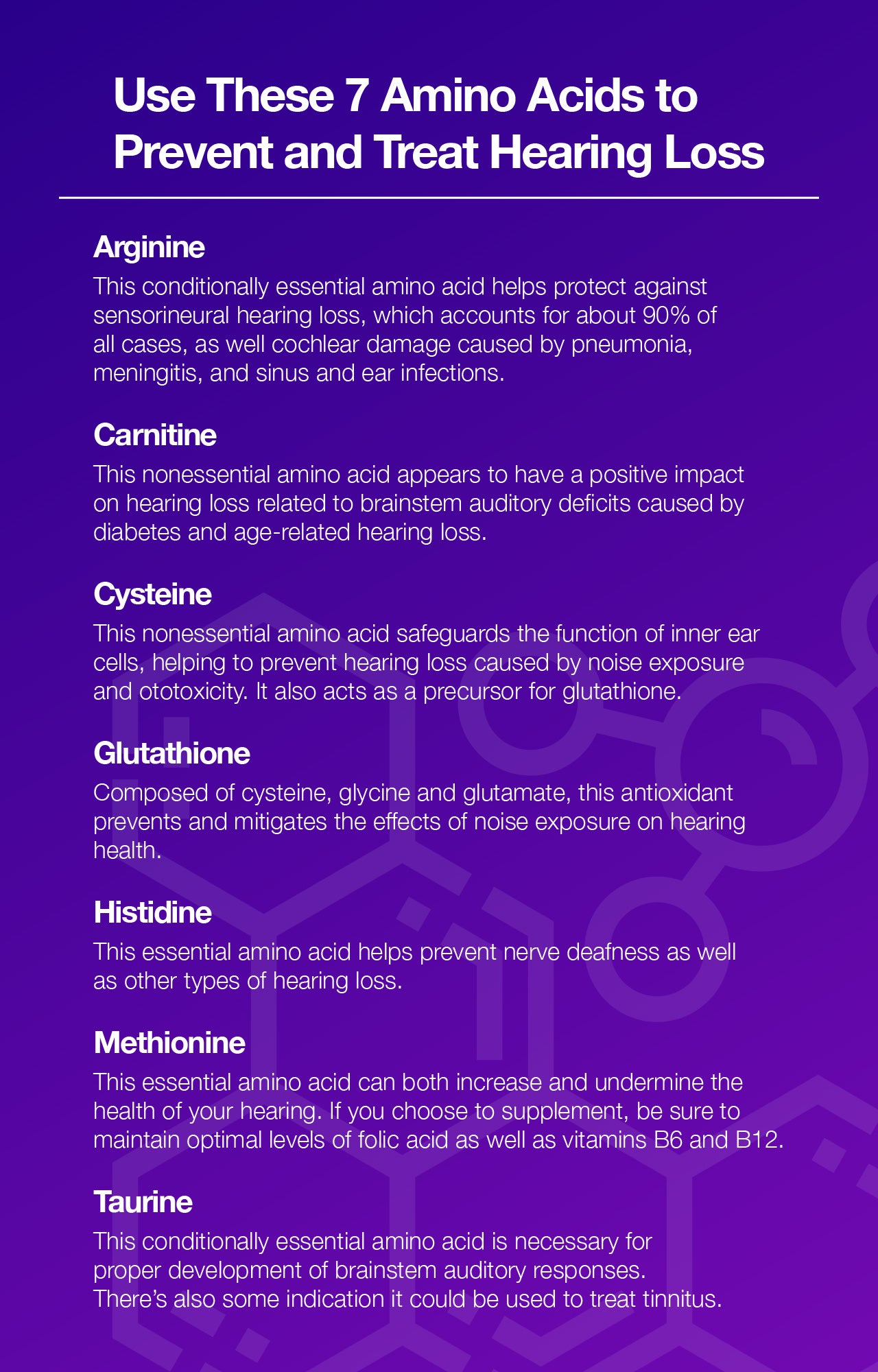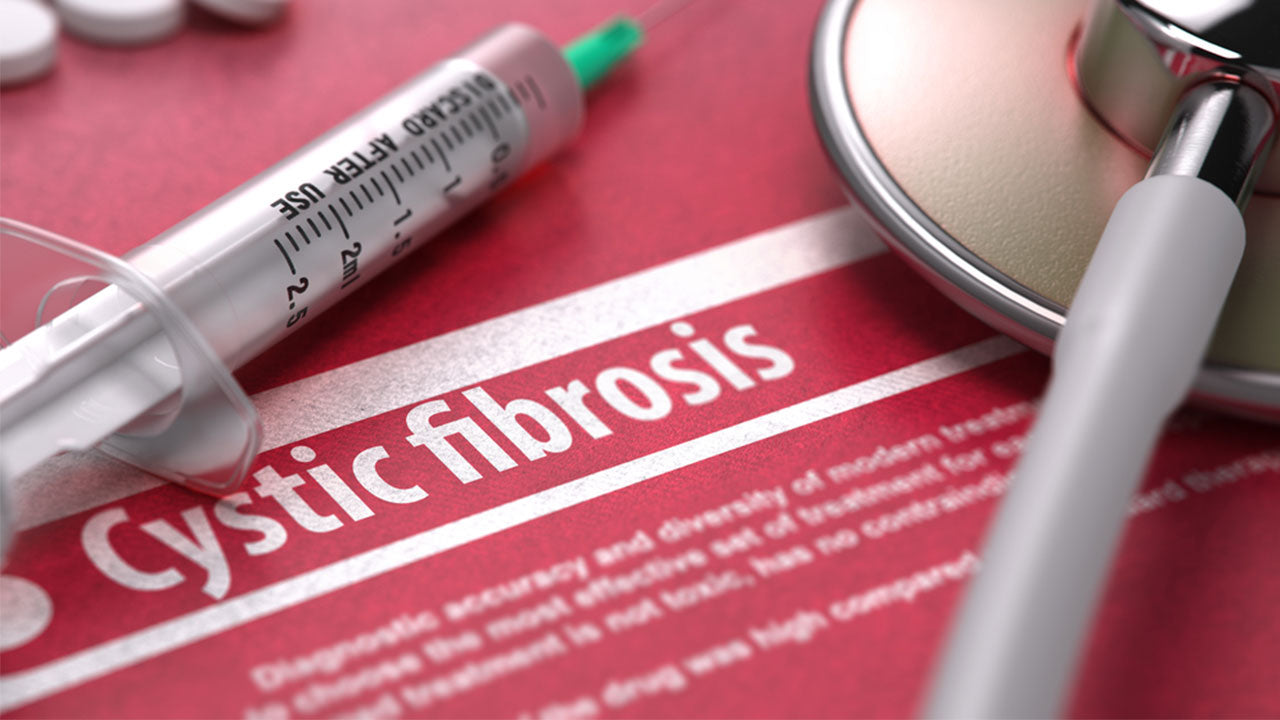Amino Acids for Hearing Loss: Understanding the Vital Role Certain Amino Acids Play
 By: by Amino Science
By: by Amino Science

Though nutrition may not be the first thing that comes to mind when you consider your hearing health, researchers working in the field of nutrient science have found that certain vitamins, minerals, and amino acids can be quite impactful. Before delving into what scientists have uncovered so far about amino acids for hearing loss, we'll first review some fundamental facts about hearing loss.
Basic Facts About Hearing Loss
Hearing loss occurs when part of the ear or overall auditory system malfunctions. Possible sites where malfunctions might occur include:
- Hair cells of the inner ear
- Organ of corti
- Spiral ganglion
- Stria vascularis
- Auditory brainstem
Hearing loss has degrees of severity ranging from mild, which limits a person's ability to hear soft sounds, to profound, which prevents a person from hearing anything but very loud sounds.
Normal hearing is defined as hearing thresholds of 25 decibels (dB) or better in both ears. Any individual who does not meet that criteria technically has some degree of hearing loss. The colloquial phrase "hard of hearing" applies to individuals with mild, moderate, and severe hearing loss. Typically, those individuals can communicate through spoken language, though they may find hearing aids, cochlear implants, captioning, and other interventions useful.
Those who identify as deaf most likely have profound hearing loss. Because they can hear very few, or no, sounds, it's common for deaf individuals to use sign language to communicate.
According to a fact sheet compiled by the National Institute on Deafness and Other Communication Disorders (NIDCD), more than 2 out of every 1,000 children born in the United States annually have detectable hearing loss in one or both ears. Hearing tests show that 13% of people over the age of 12 who live in the United States have hearing loss in both ears. Furthermore, 37.5 millions adults living in the United States experience some level of hearing loss.
As individuals grow older, their odds of experiencing hearing impairment increase. In fact, age is the single most significant predictor of hearing loss for adults between the ages of 20 and 69—the highest rates of hearing loss occur among those in the 60 to 69-year-old age bracket.
Sex affects your odds of experiencing hearing loss too. Men have nearly twice the risk women do of developing hearing loss. And race seems to play a role as well, with non-Hispanic white adults reporting higher rates of hearing loss than other racial and ethnic groups.
It's common for age-related hearing loss to become increasingly severe. Approximately 2% of adults between the ages of 45 and 54 have hearing loss significant enough to be considered disabling, meaning "hearing loss of 35 decibels or more in the better ear, the level at which adults could generally benefit from hearing aids." That rate rises to 8.5% for adults between the ages of 55 and 64. By age 65 nearly a quarter of adults could benefit from hearing aids, and by 75, more than half could.
Unfortunately, very few of the people for whom hearing aids could be helpful actually use them. Only one in three adults 70 and older with significant hearing loss have used hearing aids.

Probing the Link Between Nutrition and Hearing Health
Though some studies on nutrition and hearing health were conducted as early as the 1930s and 40s, it took until the late 1980s for researchers to clearly state that diet plays a role in the development of certain hearing disorders. Now, scientists have conclusively determined that insufficient dietary intake of certain nutrients, including amino acids, can cause hearing loss.
These findings stem largely from population-based studies as well as trials done with animal subjects. A study done by Saudi Arabian researchers, for example, looked at whether dietary deficiencies of certain amino acids correlated to hearing impairment among 18 to 21 year olds.
The authors used a food questionnaire to determine the dietary habits of study participants—with a focus on amino acid intake—in combination with other survey questions. They also reviewed existing literature and findings on the beneficial impact amino acids can have on hearing health.
First, they looked at arginine, a conditionally essential amino acid known for its blood pressure and protein synthesis benefits. "Studies have indicated that arginine is protective against sensorineural hearing loss," the authors note, as well as "cochlear damage caused by the toxins that are produced in Streptococcus pneumoniae infections." Evidence supports the use of arginine as a preventative treatment in order to provide cochlea protection. Research shows that taking citrulline as part of a complete essential amino acid supplement, such as The Amino Company's Active Aging blend, is the most effective and side-effect free way to boost arginine levels in the body.
They also address the role played by methionine, an essential amino acid with powerful antioxidant properties. This amino acid has been shown to lower a person's risk of ototoxic hearing loss, which occurs as a result of the ingestion of chemicals, including those found in some medications, that cause damage to the inner ear.
The authors mention, too, that deficiencies of methionine may produce hearing loss. They reference an epidemic of peripheral neuropathy in Cuba from 1992-1993 that affected over 50,000 people, some of whom developed high-frequency sensorineural deafness. "Obvious malnutrition was not present," the authors wrote, "but a deficit in micronutrients including methionine appeared to be a primary determinant of the epidemic."
They also reference the ability of glutathione, a free-radical scavenging antioxidant made up of three amino acids (L-cysteine, glycine, and L-glutamate), to reduce your risk of developing hearing loss caused by acoustic overstimulation, or noise exposure. "A depleted glutathione state increased noise-induced hearing loss, whereas replenishment of glutathione lessened the damage," they explained. Furthermore, glutathione can protect against ototoxic hearing loss caused by gentamicin, particularly for individuals whose diets contain low levels of protein.
Last but certainly not least, they touch on the important role played by taurine, another conditionally essential amino acid. Taurine appears to make vital contributions to the development of human hearing capacities, both anatomically and functionally. "Infants with inadequate taurine in their diets had shorter auditory brain stem responses," the authors stated. And animal studies have shown that supplementing with taurine encourages the brainstem auditory response to mature earlier.
Further Findings on Amino Acids for Hearing Loss
Taurine may hold particular promise as a means of treating tinnitus, a hearing malfunction that impacts approximately 10% of adults living in the United States. Neuroscientists at the University of California, Berkeley published findings in the journal Proceedings of the National Academy of Sciences indicating a correlation between tinnitus and decreased levels of GABA (gamma-aminobutyric acid), an inhibitory neurotransmitter. The team concluded that finding ways to change GABA functions could help to treat tinnitus, and taurine could be one possible route for doing so.
A separate study published in Hearing Research examined how daily taurine supplementation impacted chronic tinnitus in rats. Rats given a high dose of taurine—294 mg/kg—showed significantly reduced symptoms of tinnitus. "These results are consistent with the hypothesis that taurine attenuates tinnitus and improves auditory discrimination by increasing inhibitory tone and decreasing noise in the auditory pathway," the authors concluded.
The connection between amino acids and hearing health appears to be intimately intertwined with the way amino acids influence neurotransmitter levels. A review published in Neural Regeneration Research offers perspective on this issue as it applies to glutamate and glycine. "Glutamate is well established as an excitatory neurotransmitter of auditory nerve fibers," the authors explained, and likely other ascending auditory pathways as well. Glycine, meanwhile, acts as an inhibitory neurotransmitter in the central auditory system.
How to Use Amino Acids to Maximize Hearing Health
Your particular hearing concerns will determine which amino acids you'll want to seek out in order to maximize your hearing health. To optimize the benefits of these amino acids and maintain hormone balance, it is recommended to supplement with a full host of essential amino acids. The following overview of the links between certain amino acids and auditory functions can help you build a personalized diet and supplement plan.
Arginine
Evidence shows that arginine, a conditionally essential amino acid, helps protect against sensorineural hearing loss, which accounts for about 90% of all cases of hearing loss. Arginine can also prevent cochlear damage resulting from illnesses caused by Streptococcus pneumoniae bacteria such as pneumonia, meningitis, and sinus and ear infections.
Foods high in arginine include:
- Chicken
- Dairy products
- Lentils
- Turkey
- Soybeans
- Spirulina
Carnitine
Carnitine, an amino acid already quite popular for its anti-aging impact, appears to have a positive impact on hearing loss related to brain stem auditory deficits caused by diabetes. It may also increase hearing health for older individuals.
Experts advise supplementing with acetyl-L-carnitine because the body absorbs it more readily and it facilitates the transportation of fatty acids to the mitochondria of inner ear cells, a crucial step for energy production.
Cysteine
This nonessential, sulfur-containing amino acid plays a number of important roles related to your hearing. First, it safeguards the function of inner ear cells and second, it acts as a precursor for glutathione, another amino acid relevant to hearing health.
Evidence indicates that when individuals supplement with n-acetyl-cysteine, they're unaffected by noise levels sufficient to cause permanent hearing damage in other individuals. Plus, it can counteract the negative effects certain medications and cancer treatments have on your hearing, including cisplatin.
Glutathione
Deficiencies of glutathione (an antioxidant composed of cysteine, glycine, and glutamate) make individuals more susceptible to hearing loss following noise exposure. Those already experiencing this type of hearing loss can mitigate the damage by supplementing with glutathione. Glutathione also prevents gentamicin from harming the cochlear.
As we age, our glutathione levels decrease sharply. This can be particularly dramatic in the auditory nerve, raising the question of whether age-related hearing loss might be caused in part by dropping glutathione levels.
Histidine
Our bodies need histidine, an essential amino acid, to maintain the protective myelin sheaths that surround our nerves. Histidine deficiencies can contribute to nerve deafness as well as other types of hearing loss.
Methionine
Methionine keeps auditory hair cells as well as auditory neurons safe from ototoxicity, particularly from aminoglycosides, ionic platinum compounds, and cisplatin. However, this amino acid plays somewhat of a dual role in hearing health as it's a precursor to homocysteine. Excess levels of homocysteine may obstruct blood flow to the inner ear.
If you increase your methionine intake, be sure to maintain optimal levels of folic acid as well as vitamins B6 and B12 to keep your homocysteine levels in check.
Taurine
As addressed in some detail previously, humans need taurine to develop brainstem auditory responses. There's also some indication that this amino acid could be used to treat tinnitus.
Dietary taurine comes primarily from red meat, poultry, and fish, so vegetarians and vegans may need to pay particular attention to sourcing this crucial nutrient.


Up to 25% off Amino
Shop NowTAGS: benefits
Join the Community
Comments (0)
Most Craveable Recipes




 833-264-6620
833-264-6620



















